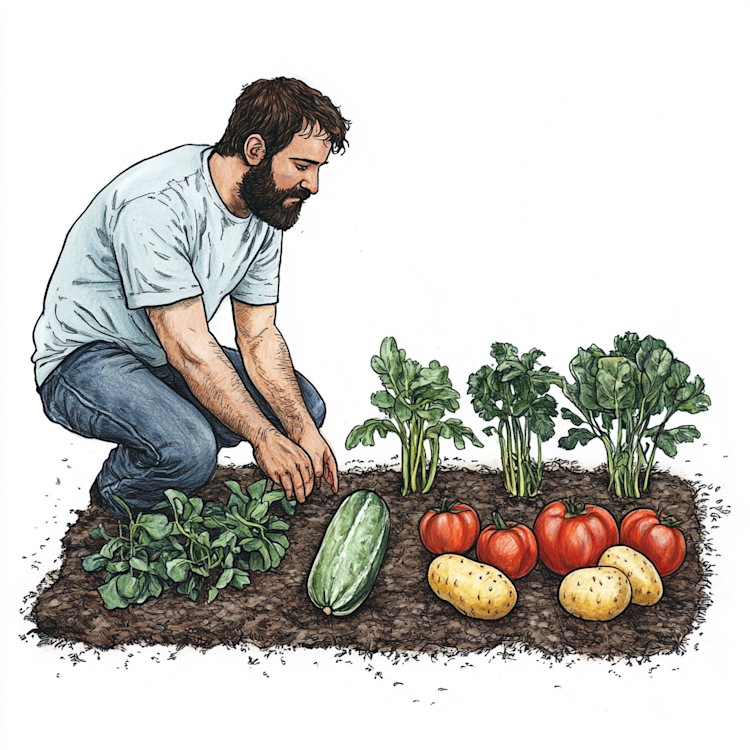
Life as a Garden: A New Framework for Achieving Balance and Success
From Pyramid to Garden: A Shift in Thinking
I used to view life like a pyramid, with work at the top and everything else—health, love, friends, and family—beneath it. This structure wasn’t just arbitrary—it came from advice I was following. I was told that if I worked hard in my 20s, the rest of my life would be easy. That advice really shaped my thinking and created this pyramid in my mind, where work had to be the top priority.
I believed that success was about doing what I said I would do and completing it. For me, if I said I would get an app into the App Store, and I did, that was success. But this approach led to pain, both physically and emotionally. Over time, I realized that prioritizing work above everything else wasn’t sustainable. The promise of an "easy life" later on started to feel less and less realistic as I found myself neglecting other important parts of my life.
That’s when I began to rethink my entire framework for success. Instead of a pyramid, I started to see life as a garden. In this garden, there are six key "vegetables": mind, body, love, family, friends, and work. Each of these areas requires attention and care. While some days you may focus more on one vegetable than the others, you can’t afford to ignore any of them for too long. Success, in this new framework, is not about singular achievements but about maintaining balance. Any effort toward balance is a form of success.
The Garden Metaphor: Life’s Six Vegetables

In my garden, each vegetable represents a different part of life. All these parts are interconnected and need nurturing. Here's how I think of them:
Mind: Just like your body or relationships, the mind is something that needs care and tending. Whether it's through learning, mindfulness, or taking breaks, nurturing your mind is crucial to overall balance.
Body: Caring for your body includes both small acts, like flossing or taking a walk, and larger ones, like regular exercise or doctor visits. These acts sustain your physical well-being and allow you to keep tending to the rest of your garden.
Love: When your mind and body are in a good place, you're more able to give and receive love—whether that's self-love, romantic love, or love for life itself.
Family: Love often extends into family—whether by blood or chosen bonds. Without care and attention, these relationships can wither, but when nurtured, they provide a deep source of strength.
Friends: Friendships require intentional effort to thrive, just like the other vegetables. Time, presence, and shared experiences nourish the friendship vegetable.
Work: Work is important, but it can’t be the only focus. It’s one vegetable in a garden of many, and it grows best when the others are tended to as well.
Tending to the Garden: Every Effort Matters
Success is about the small, consistent efforts you make to maintain balance in your life. Just as a garden needs regular care, life requires small acts of nurturing across all areas.
Body: Flossing your teeth might seem insignificant, but it's an act of tending to your body. Every small effort contributes to the overall health of the body vegetable.
Friends: Reaching out to a friend for a quick chat is a way to nurture your friendships. These moments of connection keep the friendship vegetable growing, even if it’s just a little at a time.
The Fragility of Success: When a Plant Dies
Sometimes, even when you’re doing everything right, things fall apart. Imagine growing the perfect tomato plant, nurturing it from seed, and getting ready to harvest it. Then, one morning, you wake up to find that it's gone—wiped out by disease or pests. This can happen in life too, when you lose something out of your control, like a job or a project you’ve worked on for years.
It’s devastating, but if you’ve been tending to the other areas of your garden, you won’t be left with nothing. Your mind, body, love, family, and friends will still be there, sustaining you while you rebuild and replant that work vegetable. Life is unpredictable, but a balanced garden helps you weather setbacks.
The Harvest: Success Is Temporary
Even when you succeed and harvest the fruits of your labor—whether it’s reaching a career goal or completing a big project—that success is temporary. Once the harvest is over, the plant is gone. If you’ve been neglecting the rest of your garden, you’ll be left with an empty patch.
That’s why balance is crucial. After one success, you still have to nurture the rest of your life. Success in one area doesn’t last forever, but if your whole garden is healthy, you’ll always have something else growing.
Redefining Success as Balance
In the past, I thought success meant completing a task. Now, I define success as the ability to pursue balance. Even the smallest actions—whether it's flossing your teeth, connecting with a friend, or taking care of your mental health—are steps toward success. The garden metaphor reminds me that life isn’t about singular achievements but about continually tending to all parts of life.
I no longer see life as a pyramid where work sits at the top. Instead, it’s a garden where every vegetable needs attention, and success is about nurturing the whole garden, not just one plant. The pursuit of balance keeps the garden vibrant and full of life.

